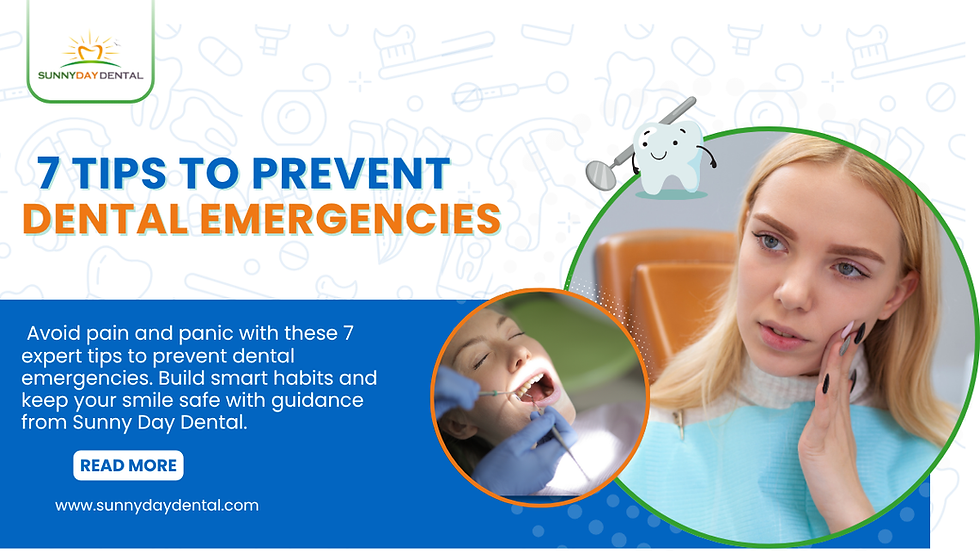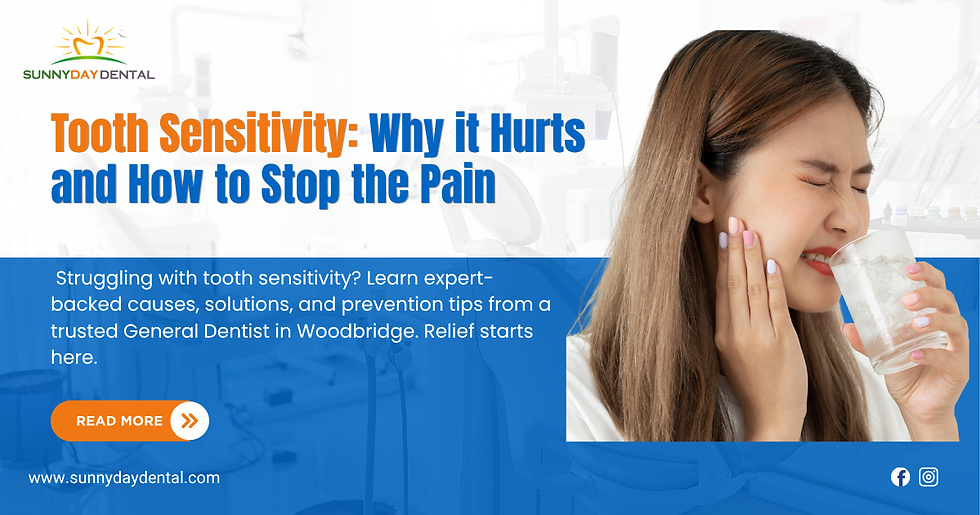7 Tips to Prevent Dental Emergencies
- Sunny Day Dental
- May 31
- 4 min read

Dental emergencies often strike when you least expect them — during a family dinner, on vacation, or just before an important meeting. The good news? Most of them are entirely preventable. As expert dentists at Sunny Day Dental, we’ve seen first-hand how proactive care can help prevent dental emergencies and save patients from unnecessary pain, panic, and expenses.
This comprehensive guide shares seven powerful and practical tips to help you safeguard your smile and avoid a sudden trip to emergency dentistry in Woodbridge.
1. Stick to a Strong Daily Dental Care Routine
Your first line of defense is a consistent and effective daily dental care routine. Brushing twice daily with fluoride toothpaste, flossing once a day, and rinsing with an antibacterial mouthwash helps remove plaque and prevent gum disease and tooth decay.
These habits may seem basic, but they are your foundation for a healthy mouth and one of the best ways to prevent dental emergencies.
Pro Tip: Replace your toothbrush every 3 months or after an illness to avoid reinfection and ensure effective cleaning.
2. Recognize Early Signs of Dental Damage
Ignoring small symptoms can turn minor issues into full-blown emergencies. Signs of dental damage like tooth sensitivity, chipped teeth, bleeding gums, or persistent bad breath often indicate underlying problems that need attention.
Do not wait until the pain becomes unbearable. Spotting these signs of dental damage early and seeking timely care helps you prevent dental emergencies before they escalate.
3. Never Skip Routine Dental Checkups
Many dental issues develop silently. Regular visits to your dentist are crucial to detect problems early. During your routine dental checkups, your dentist can spot cavities, gum issues, misalignment, or infections long before they cause pain or damage.
We recommend biannual checkups for most individuals, although some patients may need more frequent visits based on their oral health.
4. Use Protective Gear During Sports
Accidents during sports are a leading cause of chipped or knocked-out teeth. Whether you’re playing hockey or mountain biking, wear a custom mouthguard to prevent dental injuries.
If you grind your teeth at night (a condition called bruxism), a nightguard can also protect your teeth from wear and reduce the risk of fractures, helping to prevent dental emergencies.
5. Avoid Using Teeth as Tools
Opening packages, biting your nails, or cracking nuts with your teeth may seem convenient, but they can quickly lead to cracks or broken enamel. Your teeth are not built for that kind of pressure.
Using them improperly is one of the most common and easily avoidable ways to damage your smile. Being mindful of this can significantly help you prevent dental emergencies.
6. Maintain a Tooth-Friendly Diet
Your diet plays a bigger role in oral health than you might think. Avoid excessive sugary or acidic foods and drinks which erode enamel and promote decay.
Include foods rich in calcium and phosphorus to keep your teeth strong. Drinking plenty of water also helps cleanse your mouth and supports a balanced pH, which further contributes to your efforts to prevent dental emergencies.
7. Have a Dental Emergency Plan in Place
Sometimes, no matter how careful you are, emergencies can happen. Having a plan — like knowing the contact number for emergency dentistry in Woodbridge or keeping a dental first aid kit handy — can save time and reduce damage.
But remember, planning for emergencies is not a substitute for prevention. Following the above tips is your best bet to truly prevent dental emergencies from affecting your life.
Takeaway
Dental emergencies can be stressful, painful, and costly — but with consistent care, awareness, and routine check-ins, they’re mostly avoidable. Adopt these 7 tips as part of your everyday life to not just protect your teeth but also gain peace of mind.
How can I prevent dental emergencies?
To prevent dental emergencies, brush and floss daily, avoid chewing hard objects, wear a mouthguard when needed, and schedule routine dental checkups twice a year.
FAQs: Your Dental Emergency Prevention Questions Answered
1. Can flossing really help prevent dental emergencies?
Yes, flossing removes food particles and plaque between your teeth where a toothbrush can’t reach. This helps prevent cavities and gum infections that can lead to painful emergencies later on.
2. Are over-the-counter mouthguards as good as custom ones?
Store-bought mouthguards offer some protection, but they’re often bulky and don’t fit well. Custom-fitted guards from your dentist provide better comfort and effectiveness, especially during sports or if you grind your teeth.
3. How do cracked fillings lead to dental emergencies?
Cracked or old fillings can leave gaps that allow bacteria to enter, leading to decay or even infection. You might not feel pain immediately, but over time, this can result in abscesses or broken teeth that require urgent care.
4. What foods should I avoid to prevent dental emergencies?
Steer clear of sticky candies, ice cubes, hard snacks like popcorn kernels, and acidic drinks like soda. These can break, erode, or weaken your teeth, increasing your risk for dental trauma or decay.
5. What should I do if I lose a tooth during an accident?
Handle the tooth by the crown (not the root), rinse it gently with water, and try placing it back in the socket if possible. If not, store it in milk and reach out to a clinic offering emergency dentistry in Woodbridge within 30 minutes for the best chance of saving the tooth.




Commentaires